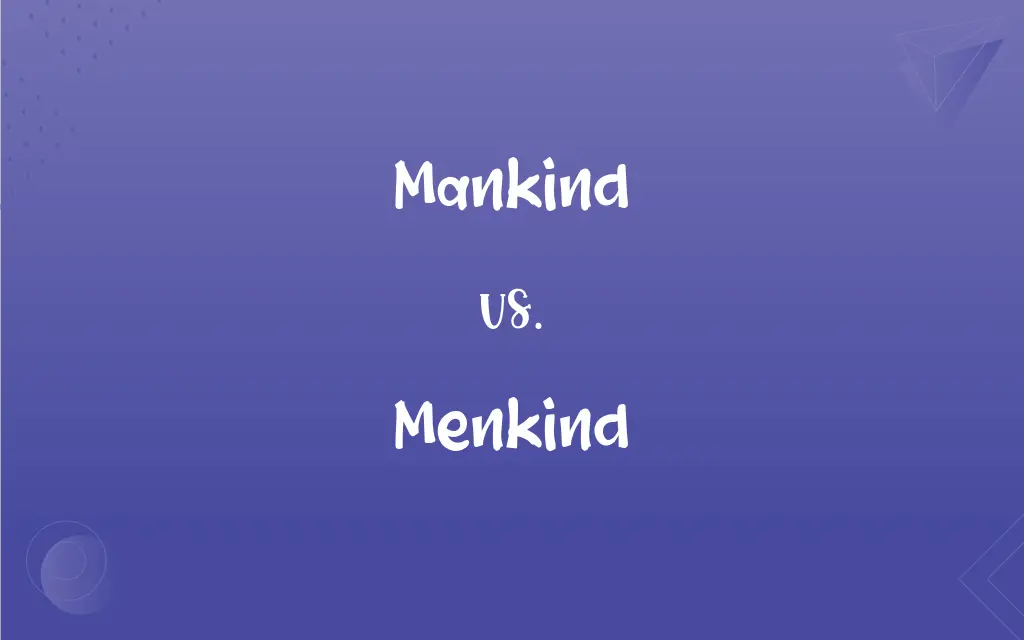Mankind vs. Menkind: What's the Difference?
By Harlon Moss || Updated on May 21, 2024
Mankind refers to all human beings collectively, encompassing all genders, while menkind specifically refers to male humans, highlighting the gender distinction.

Key Differences
Mankind is a term used to refer to the entire human species, inclusive of all genders. It is often used in a general context to denote humanity as a whole. This term carries a universal implication, focusing on human beings collectively without emphasizing gender. Menkind, on the other hand, is less commonly used and specifically refers to male humans. It emphasizes the male portion of the human species, thereby excluding females and other genders. This term is often seen in historical or literary contexts where the distinction of gender is intentional.
While mankind is a broad and inclusive term, menkind is narrow and exclusive. Mankind represents unity and the collective progress of humanity, whereas menkind highlights gender-specific traits and contributions.
The usage of mankind is prevalent in various formal and informal contexts, often symbolizing the human race's endeavors and achievements. In contrast, menkind is rarely used in modern language and can sometimes appear archaic or specialized, focusing solely on male perspectives.
Mankind is inclusive and promotes equality by encompassing all humans, regardless of gender. Menkind, however, segregates by focusing only on males, often implying a historical context where males were the primary focus of societal contributions.
Comparison Chart
Scope
All humans
Male humans
ADVERTISEMENT
Inclusivity
Inclusive of all genders
Exclusive to males
Common Usage
General and widespread
Rare and archaic
Context
Universal and modern
Historical or literary
Symbolism
Unity and collective progress
Gender-specific traits
Mankind and Menkind Definitions
Mankind
Symbolizes the human race as a whole.
The history of mankind is rich with innovation.
ADVERTISEMENT
Menkind
Can denote historical male contributions.
The bravery of menkind in wars has been documented extensively.
Mankind
Refers to all human beings collectively.
The advancements of mankind have shaped our modern world.
Menkind
Refers to male humans specifically.
The achievements of menkind were often highlighted in ancient texts.
Mankind
Represents humanity in general.
The future of mankind depends on sustainable practices.
Menkind
Used in a historical or literary context.
Menkind's role in early civilization is a subject of study.
Mankind
Used to denote the entirety of human civilization.
Mankind's curiosity has led to great scientific discoveries.
Menkind
Highlights gender-specific human traits.
Literature often glorified the virtues of menkind.
Mankind
The human race; humankind. See Usage Note at man.
Menkind
Emphasizes the male portion of humanity.
In past societies, menkind dominated the political sphere.
Mankind
The human race in its entirety.
Menkind
Menfolk
Mankind
Men as opposed to women.
Mankind
Men collectively, as opposed to all women.
Mankind
(obsolete) Human feelings; humanity.
Mankind
The human race; man, taken collectively.
The proper study of mankind is man.
Mankind
Men, as distinguished from women; the male portion of human race.
Mankind
Human feelings; humanity.
Mankind
Manlike; not womanly; masculine; bold; cruel.
Are women grown so mankind? Must they be wooing?
Be not too mankind against your wife.
Mankind
All of the inhabitants of the earth;
All the world loves a lover
She always used `humankind' because `mankind' seemed to slight the women
Mankind
Encompasses all genders within the human species.
Mankind must work together to combat climate change.
FAQs
Is menkind specific to any gender?
Yes, menkind specifically refers to male humans.
Can mankind and menkind be used interchangeably?
No, mankind is inclusive of all humans, whereas menkind only refers to males.
Is menkind considered outdated?
Yes, menkind is considered outdated and is rarely used in contemporary language.
Does mankind include women?
Yes, mankind includes all genders, encompassing the entire human species.
What does mankind mean?
Mankind refers to all human beings collectively, inclusive of all genders.
Does mankind have any negative connotations?
No, mankind generally has a positive or neutral connotation, representing all humans.
Can mankind be used in scientific contexts?
Yes, mankind is often used in scientific contexts to refer to human species.
In what context is menkind typically used?
Menkind is typically used in historical or literary contexts focusing on males.
Is menkind a term used in legal documents?
No, menkind is not commonly used in legal documents.
What is the plural form of mankind?
Mankind is a collective noun and does not have a plural form.
Is menkind a commonly used term?
No, menkind is rarely used in modern language and often appears archaic.
Does the term mankind promote gender equality?
Yes, mankind is an inclusive term that encompasses all genders.
Is mankind used in religious texts?
Yes, mankind is often used in religious texts to refer to all humans.
Can menkind be found in modern literature?
It is rare but possible to find menkind in modern literature, usually for stylistic reasons.
Why is mankind more commonly used than menkind?
Mankind is more inclusive and modern, representing all humans collectively.
Can mankind refer to human achievements?
Yes, mankind often refers to collective human achievements.
What is the plural form of menkind?
Menkind, being rarely used, also does not have a common plural form.
Does menkind appear in historical documents?
Yes, menkind can appear in historical documents, often highlighting male contributions.
Does menkind have a specific origin?
Menkind originates from old English and historical usage, focusing on males.
Is it appropriate to use mankind in gender-neutral contexts?
Yes, mankind is appropriate for gender-neutral contexts as it includes all genders.
About Author
Written by
Harlon MossHarlon is a seasoned quality moderator and accomplished content writer for Difference Wiki. An alumnus of the prestigious University of California, he earned his degree in Computer Science. Leveraging his academic background, Harlon brings a meticulous and informed perspective to his work, ensuring content accuracy and excellence.































































